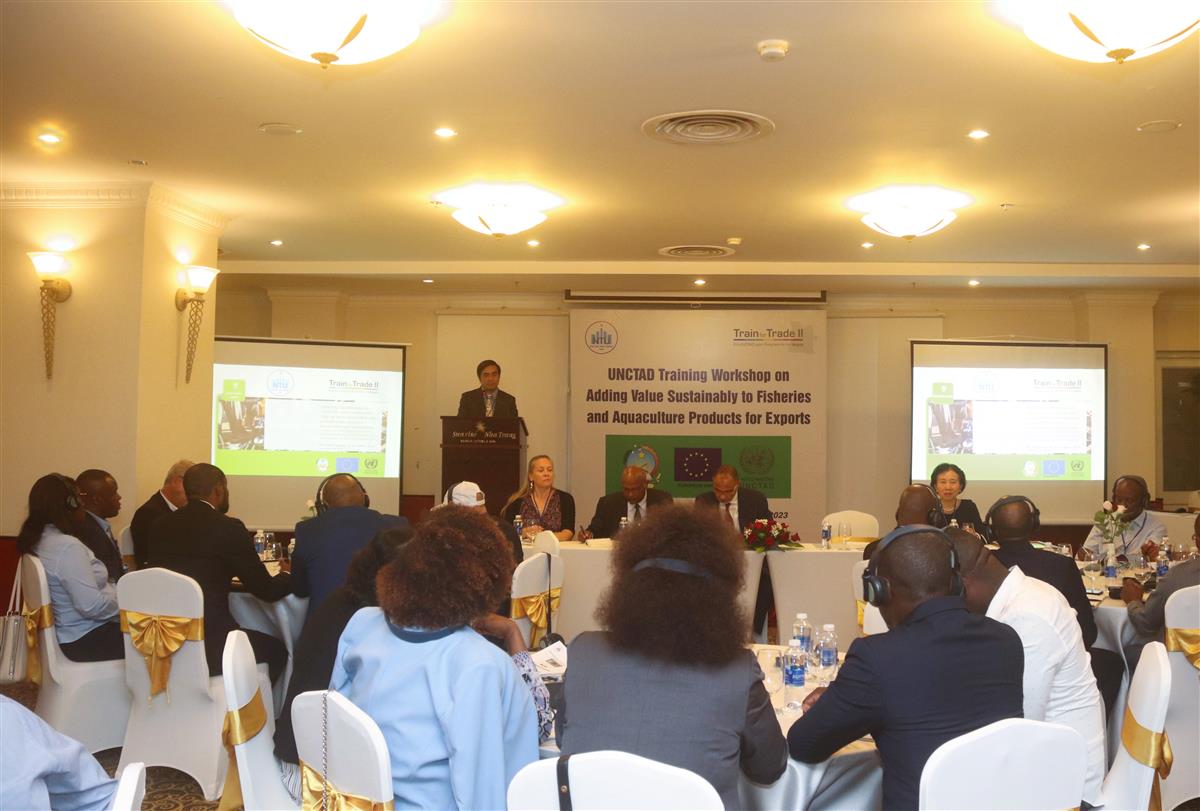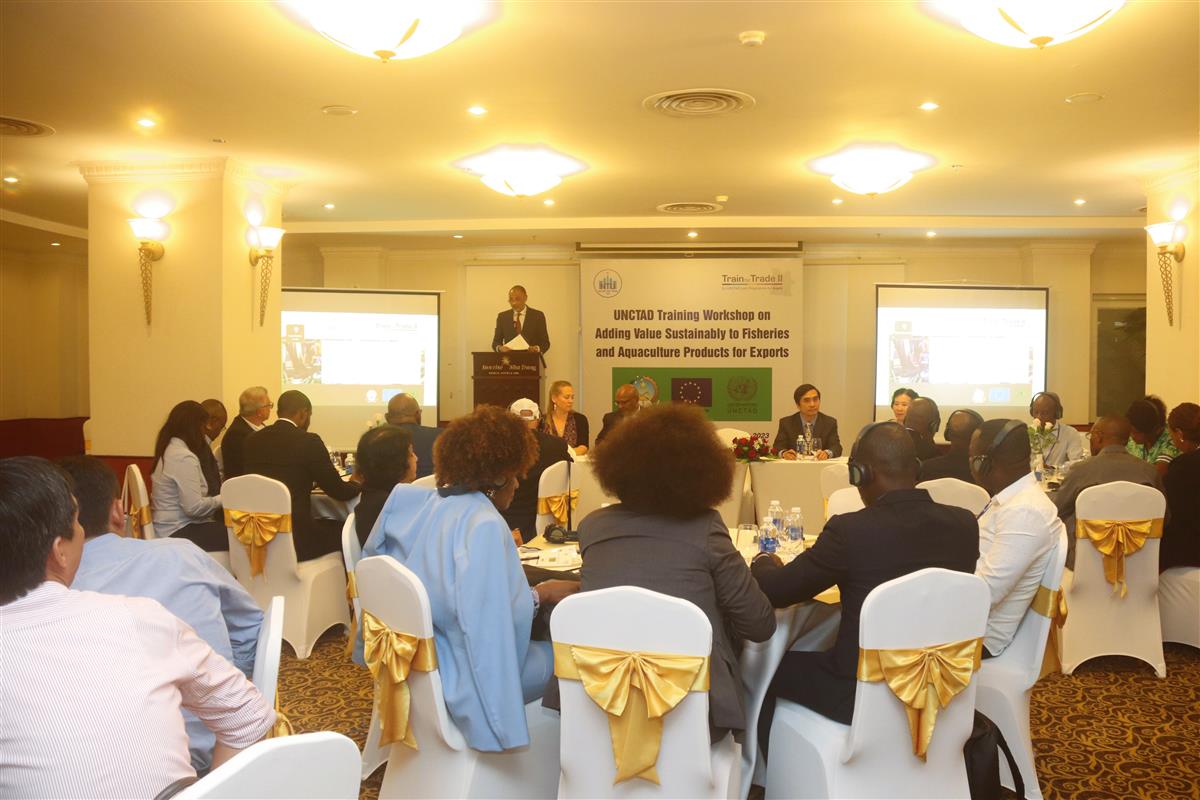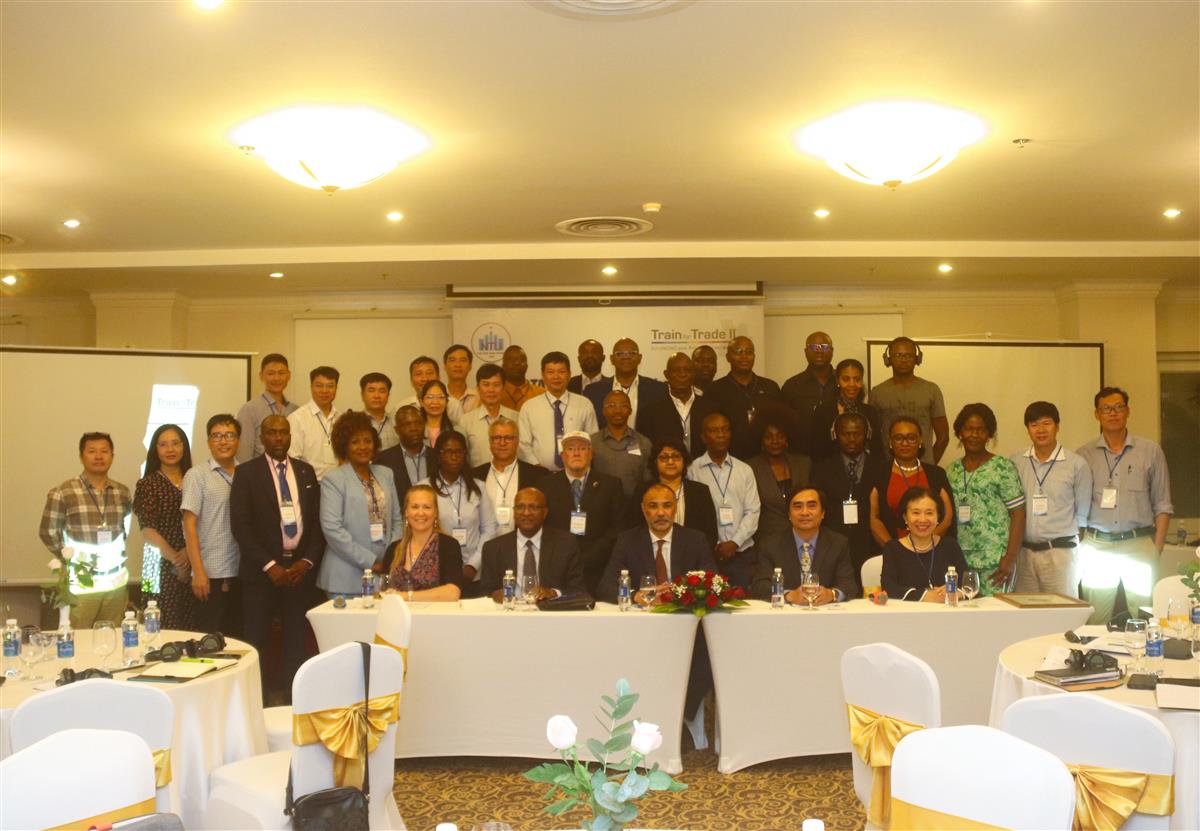Nha Trang, Viet Nam, 30 October – 3 November 2023
The workshop is organized by UNCTAD in collaboration with the UNCTAD Center of Excellence, Nha Trang University, Vietnam.
Retuning the engine of Angola’s economy towards greener and more inclusive growth
Angola, the Southern African nation home to more than 35 million people, is one of the 46 least developed countries (LDCs) recognized by the United Nations. The commodity-dependent economy, which in 2021 relied on crude oil for 94% of its exports, urgently needs to advance efforts towards a green and inclusive diversification of the economy. This dependence has left Angola extremely vulnerable to external shocks, and has not enabled development and prosperity to reach all citizens. Despite its rich natural resources, one-third of Angola’s population still lives below the international poverty line of USD 2.15 per day and inequality remains striking.
Angola is focusing on developing the fisheries and aquaculture sector as one of its priority sectors for future greener and more inclusive growth. Since 2017, UNCTAD has been supporting the country to modernize its economy through the EU-UNCTAD Joint Programme for Angola: Train for Trade II, with funding by the European Union. The Programme builds Angola’s productive capacities across seven economic policy areas simultaneously, helping the country to address binding constraints to its development by fostering green and creative value chains; bolstering entrepreneurship; encouraging investment; facilitating the development of transport infrastructure; and supporting trade policy and more fluid trade procedures. As a part of this Programme, UNCTAD is joining hands with the Nha Trang University of Viet Nam (NTU) to train Angolan fisheries and aquaculture sector stakeholders in sustainable fisheries management and value addition for exports. The timing is opportune, as 2023 marks five years of partnership between UNCTAD and NTU since the signing of a Memorandum of Understanding between the two institutions in 2018.
Speaking from Viet Nam, UNCTAD’s director for Africa, Least Developed Countries and Special Programmes, Mr. Paul Akiwumi, emphasized, “As a Center of Excellence, Nha Trang University is uniquely positioned to share the lessons and good practices learned from the highly successful Vietnamese experience in fisheries and aquaculture sector development”. He emphasized how Viet Nam can serve as a model for other developing countries, including least developed countries in Asia and Africa.
NTU has more than 65 years of service in fisheries and aquaculture, and a wealth of expertise and experience. Vice Rector, Associate Professor Pham Quoc Hung, “Express[ed] our strong commitment and willingness to support capacity building to develop fisheries and aquaculture for LDCs in Africa”.

Prior to 2002, Angola's fisheries industry was the country's third most significant economic sector but has since fallen behind. With its vast coastline and productive and diversified marine ecosystem, Angola has abundant marine resources. Total official fisheries production in Angola reached over 411 thousand tons in 2021. In 2022, the sector contributed approximately 4.1% to the country’s GDP. The Angola National Development Plan (NDP 2023-2027) forecasts a growing contribution of fisheries to GDP, reaching 4.5% in 2027. The National Plan for Fisheries (PLANAPESCA) intends to foster entrepreneurial fishing activity and boost fish and salt production and processing. The State has pledged investments totaling USD 300 million over the next five years.
Fisheries and aquaculture make major socio-economic contributions to the country. Approximately four million people build their livelihoods on the primary fisheries sector in Vietnam. Aquaculture provides jobs for an estimated 2.6 million people. The industry directly employs around 150,000 people, while in coastal communities, approximately half of the population depends directly or indirectly on fisheries.
Beyond its extensive coastline and Exclusive Economic Zone, Angola has several opportunities to develop the fisheries sector, including through encouraging fish processing and value addition, fostering regional and international collaboration, and building enhanced foreign trade networks.
Showcasing the Vietnamese fisheries development path
Vietnam has a remarkable story of fisheries sector development, which the country is poised to share with other developing countries through South-South cooperation. From 1997 to 2022, Vietnam’s seafood exports increased eleven-fold, from 771 million USD to a remarkable 11.4 billion USD. Currently, Vietnam is the third largest exporter of fish and fisheries products in the world. Notably, nearly54 percent of national production comes from the aquaculture sub-sector. Fisheries trade between Angola and Vietnam has also shown remarkable growth over recent years. Fisheries imports from Angola reached 15 million USD in 2022, making Vietnam the top fisheries trade partner of Angola, ahead of the European Union.
In comparison, Angola's fish exports were valued at 72 million USD in 2022. However, the country also imported fisheries products worth 117 million USD during the same year. Angola’s fisheries exports are the low, when compared to other LDCs such as Bangladesh and Uganda - two countries that have substantially improved their fisheries exports to reach 614 million USD and 177 million USD, respectively, in 2022. Yet Angola’s potential is much greater, if effectively and sustainably harnessed. Value addition and the use of aquaculture as a method to boost production sustainably and alleviate the burden from capture fisheries could accomplish this.
Highlighting the sector’s potential, Director Akiwumi said, “Angola must view its marine and freshwater resources as strategically important for economic diversification, job creation and poverty reduction, while maintaining a strong commitment to environmental sustainability”.

Key challenges facing Angola’s fisheries sector
As with most LDCs, Angola’s fisheries sector is characterized by the co-existence of small industrial fishing, side-by-side with dominant artisanal, informal or traditional fishing activities, which make the sector a survivalist activity, characterized by rudimentary infrastructure and poor quality. Industrial fishing is still at an infant stage and dominantly based on fish license fees with little or no value addition, job creation or poverty reduction. Overall, the fisheries sector is yet to become modern and dynamic, although it is gradually and partially transforming itself from "traditional" to "artisanal".
Lack of public investment and poor infrastructure, including the provision of electricity, transport and research laboratories undermine the crucial role of the sector for the socio-economic development of Angola. The country’s trade and development policies should focus on how to best harness the socioeconomic potential of the fisheries sector.

Crucial South-South cooperation and triangular partnership
UNCTAD’s workshop on adding value sustainably to fisheries and aquaculture products for exports, delivered in collaboration with the NTU, is a clear demonstration of successful South-south cooperation and effective triangular cooperation, with the EU providing financial support and Vietnam sharing their praiseworthy expertise and experience in advancing the development of the fisheries and aquaculture sector. The initiative also demonstrates Vietnam's keen interest in South-South cooperation and the country’s willingness to share its valuable experience and expertise with other developing countries, including LDCs.
South-South cooperation, beyond offering opportunities for trade and investment expansion, has a key role in promoting the transfer of technology, knowledge and expertise through programs, projects, and initiatives, while helping to solve specific problems in countries of the Global South, including in Angola.
The training workshop provides opportunities for expertise and experience sharing, complemented by site visits to better understand, first-hand, the Vietnamese approach to fisheries and aquaculture. The participants will learn about strategies necessary to enhance the role of fisheries in trade, key perspectives on sustainability and global good practices on value addition. Based on Vietnam’s experience, they will also explore options for optimizing the use of marine materials by producing high-value sustainable products such as health foods and consider options for value addition through seafood waste and other marine products like seaweed. The training will cover essential elements for sustainably managing the supply chain to increase aquatic production and exports, including by managing finfish species and aquaculture. Thanks to the support of the International Standardization Organization (ISO), including Vietnam’s National Standardization Body STAMEQ, the participants will gain knowledge of relevant international standards for fisheries exports, and share experiences on improving international competitiveness while ensuring food safety.
The expectation is that the 21 Angolan fisheries sector experts from the private and public sectors, as well as academia will employ the knowledge gained and share it widely with their respective institutions, towards concrete progress in fisheries and aquaculture development in Angola.

Globally, fisheries production reached 178 million tons in 2020 (FAO 2023) from 134 million tons in the 2000s. In 2020, developing countries account for about 60% of world fish production, up from about 34% in 1976. Between 2000 and 2020, capture fish stagnated at about 90 million tons (in 2020 it reached 90.3 million tons), whereas aquaculture grew to 122.6 million tons in 2020 against around 40 million tons in 2000. Aquaculture production is expected to grow at an average annual growth rate of 4.5% over the period 2010–2030 and projections show that by 2030 cultured fisheries would equal or slightly exceed captured fish in global fish supply. The volume of fish traded is expected to grow from 187 million tons in 2017 to 250 million tons by 2050. In value terms, fish exports reached 118 billion USD in 2022, which is slightly lower than the value in 2018 (which stood at 131 billion USD) but are expected to reach US$ 150 billion by 2035. Human consumption of fisheries products increased at an average annual rate of 3.0%, compared with a global population growth rate of 1.6%. The proportion of fish used for direct human consumption has increased from 67% in the 1960s to about 88% in 2018 (and is expected to reach 89% by 2030). Per capita consumption has also more than doubled over the last five decades (from 9.9 kg in the 1960s to 20.2 kg per person in 2020). Regarding employment, in 2020, an estimated 58.5 million people were engaged in fisheries and aquaculture, and of these, approximately 21 percent were women.